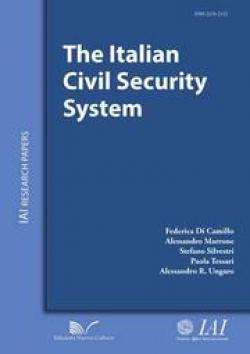The Italian Civil Security System
Civil security is an increasingly important policy field in Europe, as both member states and the EU work to protect European societies from a range of threats and risks including natural and man-made disasters as well as terrorist attacks. Over time, each European country has developed a unique civil security system based on its national specificities, which interacts with both neighbour countries and the Union. This research paper analyses the Italian case on the basis of four analytical dimensions: cultural and historical aspects, legal aspects, the relation between the civil security system and citizens, the role of private sector. Three critical qualitative measures of the system are also discussed: effectiveness, efficiency and legitimacy. In addition, because of the importance of international cooperation and EU role in this field, the relations between the Italian security system and the European contest context are addressed. Specific attention has been devoted to the way the system responded to the earthquake in L'Aquila and the pandemic influenza A (H1N1), both occurred in 2009, as major crises faced in the last decade. In particular, the L'Aquila case study has underlined both strengths and weaknesses of the way the system does function. Several key points of the Italian civil security system have been identified, such as the flexible cooperation among institutional actors, the issue of levels of governance, the role of changing legal frameworks, the contribution of non-profit organizations.
Study produced within the framework of the project Analysis of Civil Security Systems in Europe (ANVIL), financially supported by the European Union 7th Framework Programme.
Italian version: Quaderni IAI 8.
-
Details
Roma, Nuova Cultura, February 2014, 114 p. -
Issue
11 -
ISBN/ISSN/DOI:
978-88-6812-248-5
Executive Summary, p. 7-9
Introduction, p. 11-15
List of Acronyms, p. 17-18
Overview, p. 19-25
1. Cultural and historical aspects of the civil security system, p. 27-38
1.1. Administrative tradition
1.2 Government/social culture
2. Legal/constitutional aspect, p. 39-55
2.1 Statutory basis
2.2. Political dimension
2.3 Operational dimension
2.4 External dimension
3. The relations between the civil security system and citizens, p. 57-62
3.1 Expectations
3.2 Information
3.3 Education
4. The role of the private sector in maintaining civil security, p. 63-67
4.1 Role of societal/non-profit organizations/NGOs
4.2 Role of profit-oriented organizations
5. Quality measure: Effectiveness, p. 69-74
5.1 Assessments through professional and political inquiries
5.2 Limits to national capacities
6. Quality measure: Efficiency, p. 75-78
7. Quality measure: Legitimacy, p. 79-82
7.1 Political support
7.2 Legal support
7.3 Popular trust and support
8. Italy’s civil security in the EU context, p. 83-88
Conclusions, p. 89-97
Bibliography, p. 99-114
Topic
Tag
Related content
-
Publication21/04/2014
Il sistema di sicurezza civile italiano
leggi tutto -
Publication23/03/2014
Country Study: Italy
leggi tutto -
Ricerca08/01/2014
ANVIL - Analysis of Civil Security Systems in Europe FP7-SEC2010
leggi tutto



